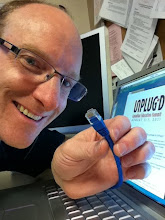There was a time not too long ago, when I was lonely in my professional life. Although I felt that I was doing really good work in the area of gifted education, few of my local colleagues had any idea of the work I was doing. It was only when I had the opportunity to meet face-to-face with regional gifted education specialists, that I felt connected to a tribe. Kindred spirits who truly understood what I was going through, began to share resources and strategies and to collaborate in the delivery of regional events for gifted learners.
A few years later I found myself in a newly created provincial role, assisting district school boards in leveraging e-learning tools. My tribe was small, with six widely scattered teachers attempting to do the same work across the province of Ontario. Our team stayed in touch with weekly meetings that always included a few minutes sharing personal and familial stories. Although we only met face to face a half dozen times in the two years I was in the role, I continue to feel a deep sense of connection with these colleagues.
One of my local tribe-mates, Jim Pedrech, is a talented teacher who until recently was unaware that he had many peers who were engaged in similar missions, sharing relevant and compelling learning experiences with students. Today, Jim pointed me to a talk that highlights the value of working and learning with a cadre of compadres.
In this TEDxUSC video, Rodney Mullin tells the story of a skateboarding tribe that builds on the creative work of members in order to ensure the collective moves forward. In many ways the work of these individuals mirrors the work many of us are engaged in when we share the triumphs and tragedies taking place in our classrooms. If you can't spare the time for this entire video, jump to this point... but hear the word 'teachers' when he says the word 'skaters'.
In classrooms all around the world, innovators are doing creative work engaging apt tools to help their students learn relevant skills... and they're doing so alone. Many have yet to discover who their peers are, let along to connect with them in meaningful ways. While a wide range of social media tools now allow such teachers to find one another, most have no idea who their tribemates are. The most lonely, may be those who have discovered true peers in this online world, but who rarely if ever have opportunities to meet face-to-face with their recently discovered colleagues. The lucky few who have intermittent opportunities to engage in conversations and face-to-face meetings, should not take for granted such connective opportunities.
One of my distant colleagues, David Truss has been thinking about the difference between his online self, his real world self. David's words ring more true for me than they otherwise might, in large part thanks to numerous face-to-face conversations we were able to share at the recent Connected Canada Conference: "The point is that we are sharing more and more of ourselves online and that ‘person’ that we share online is becoming a bigger & bigger part of who we really are."
I think that the more comfortable we become within a community of online peers, the more we let our true selves leak into the community. Our voices become more authentic, our lives become more transparent, and our relationships become more meaningful. Just as skateboarders push the boundaries of what is possible by sharing within a tight-knit community, once lonely teachers who might otherwise push boundaries in secret, are becoming kindred spirits and members of a growing tribe.
Saturday, June 16, 2012
blog comments powered by Disqus



